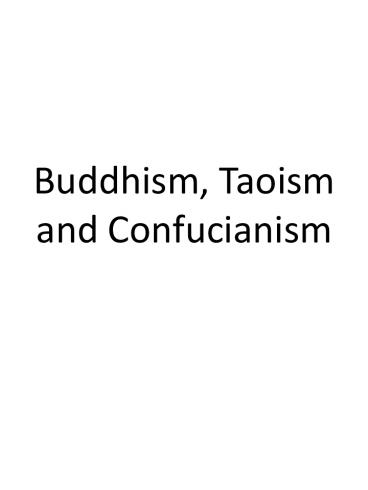Buddhism, Taoism and Confucianism - PowerPoint PPT Presentation
1 / 12
Title:
Buddhism, Taoism and Confucianism
Description:
Typically Buddhists will have no objections to autopsies, transfusions or ... Some Buddhists might refuse medications that interfere with meditation ... – PowerPoint PPT presentation
Number of Views:549
Avg rating:3.0/5.0
Title: Buddhism, Taoism and Confucianism
1
Buddhism, Taoism and Confucianism
2
History of Buddhism
- 570-632 Life of Siddhartha Gautama (the Buddha
enlightened one) - Seers predicated that he would become with a
great king or a great holy man, so he was raised
in a completely protected environment - Eventually he saw a sick man, old man dead man
- Became an ascetic (someone who practices fasting
and other forms of self-denial) - Finally achieved enlightenment under the bodhi
tree
3
Buddhisms 4 Noble Truths
- All life is suffering
- The cause of suffering is desire (craving)
- The way to eliminate suffering is to eliminate
desire (Nirvana) - The way to eliminate desire is not by asceticism,
nor ordinary life, but the middle way of the
eightfold path (a basic moral code)
4
Reincarnation in Buddhism
- Cause of reincarnation is desire (especially
desire for separateness) Tanha - Desire leads to traces of self continuing in
reality - Idea of individual soul is an illusion
- When this illusion is finally dispelled, one
achieves enlightenment and the egoless state
of nirvana - Nirvana is not heaven or God (Brahman), but a
state of union with impersonal reality
5
Major Buddhist Groups
- Early Buddhism (Theravada-S.E Asia) taught that a
person can only achieve Nirvana alone and
stressed meditation practice - Later Buddhism (Mahayana-N.E. Asia) emphasized
loving kindness and that people must work
together to achieve Nirvanaemphasis on
Bodhisattvas (many statues of such), who are
Buddhas that choose to forego Nirvana and remain
on earth to help others - Gampo Abbey in Cape Breton is from the Tibetan
Shambhala tradition which is a Mahayana form of
Buddhism http//www.gampoabbey.org/
6
Chinas Complementary Religions
- In China traditionally there have been three
major religions - Confucianism
- Taoism
- Buddhism
- Unlike in the West, in which Religions have
tended to be exclusivist in nature (you cannot
be a member of multiple religions, but must
choose one), Chinese people have traditionally
accepted that one can be a member of any one of
these religions or all of them at one time
(inclusivist religions)
7
The Tao or Way
- In Chinese religious tradition there are many
ways or religions, but one of the oldest of
these is the philosophy of Taoism THE way,
first promulgated by ancient sages as far back as
the Shang Dynasty (1523 BCE) - Two opposing forces in the world Ying and Yang
- No single founder and no central authority, just
a spiritual tradition based on a diverse array of
ancient and modern writers
8
Chuang Tzu - Translator Burton Watson Where is
the Tao? (Section Twenty-Two)
- Master Tung-kuo asked Chuang Tzu, "This thing
called the Way-where does it exist?" - Chuang Tzu said, "There's no place it doesn't
exist." - "Come," said Master Tung-kuo, "you must be more
specific!" - "It is in the air."
- "As low a thing as that?"
- "It is in the grass."
- "But that's lower still!"
- "It is in the tiles and shards."
- "How can it be so low?"
- "It is in the piss and shit."
9
Confucianism
- Whereas the Taoist focuses on nature and the
otherworldly Tao, Confucians focus on the worldly
affairs of daily life (home and public) as the
chief arena in which to seek a balance - Confucius (Master Kung) taught a pragmatic
philosophy of getting along with people and
organizing community affairs that became a
standard in Chinese life after his death. - Philosophy meant to be complementary to any
religious outlook that might predominate in ones
community
10
Bioethical Issues
- Typically Buddhists will have no objections to
autopsies, transfusions or transplants (check for
variations) - Most Buddhists only allow abortion in cases of
threat to mothers physical or mental health - Some Buddhists and Taoists might refuse
medications that interfere with meditation
practice - Some Taoists might because Yin and Yang are
associated with Feminine and Masculine traits
hold discriminatory attitudes towards homosexuals
11
Falun Gong
- Falun Gong (alternatively Falun Dafa) is a system
of beliefs and practices founded in China by Li
Hongzhi in 1992 - Falun Gong places a heavy emphasis on morality in
its central tenets Truthfulness, Compassion,
and Forbearance - Its teachings include concepts from qigong,
Buddhist and Taoist traditions
12
What is a cult? Some difficulties
- The word cult pejoratively in everyday speech
refers to a group whose beliefs or practices are
considered abnormal or bizarre - The popular, derogatory sense of the word has no
currency in academic studies of religions, where
"cults" are generally subsumed under the neutral
label of "new religious movement, however, some
religious studies scholars have sought to narrow
the definition of cult to refer to groups seen
as particularly authoritarian - For example of one way some theorists try to mark
a distinction between cults and religions is
whether prospective members are able to fully
access to the teachings of a group before
becoming members

